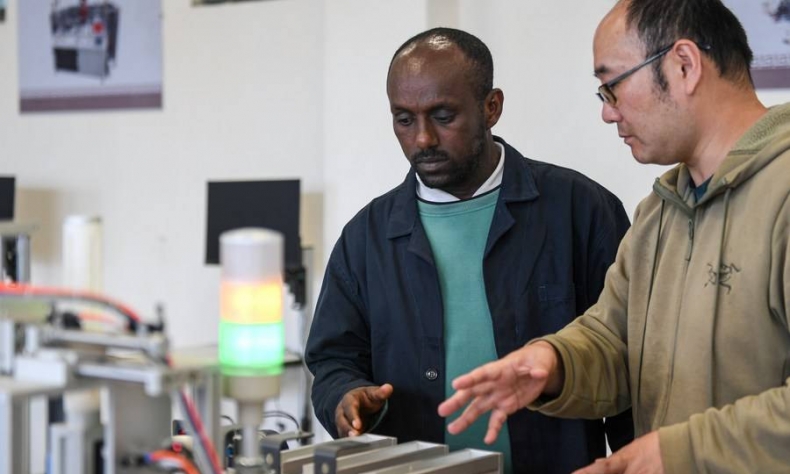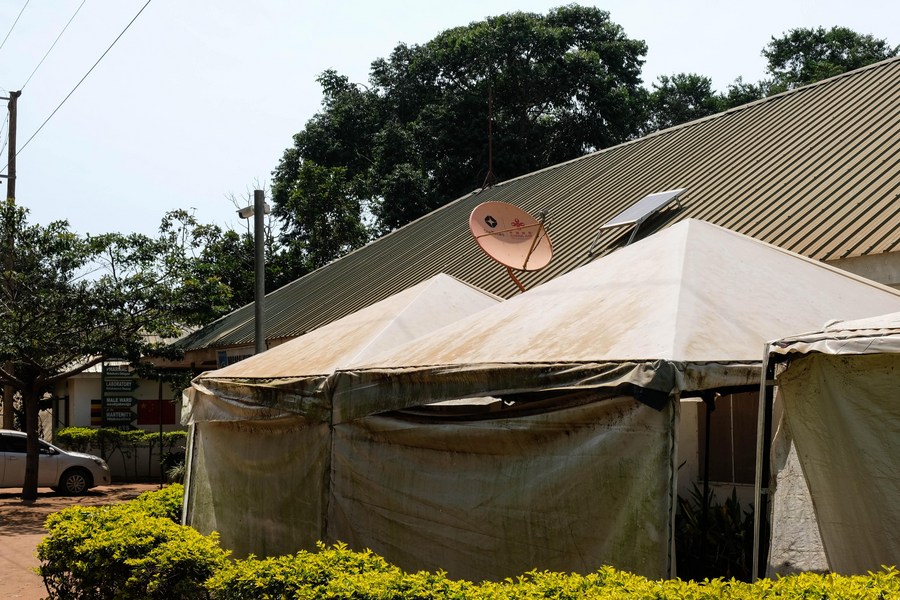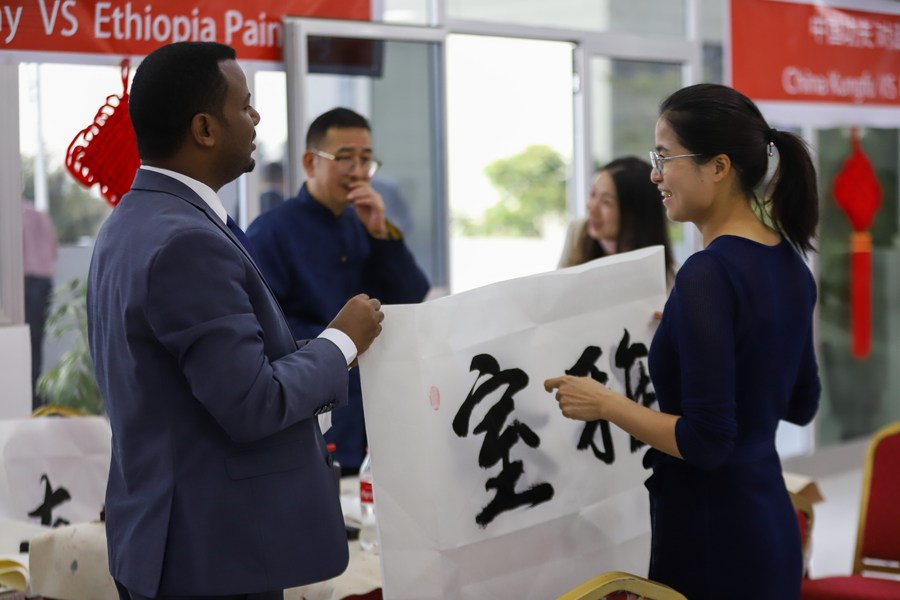Creating a New Discourse

Through knowledge sharing, China and Africa could reinforce each other’s discourses and cultural traditions. This will help to promote the spirit of China-Africa friendship and cooperation, and project a unified voice of the Global South.
With growing economic vitality, African nations are placing more emphasis on building their own knowledge systems. China firmly supports African countries in achieving intellectual independence, which is essential for their self-development and modernisation. At the 13th meeting of the China-Africa Think Tanks Forum, scholars from both regions jointly proposed the China-Africa Dar es Salaam Consensus. This first consensus among Global South countries represents shared understanding and commitment on the path of development, and calls for practical measures to promote knowledge sharing across nations.
China and Africa, both part of the Global South, should overcome the barriers erected by the Western discourse system. Through knowledge sharing, they could reinforce each other’s discourses and cultural traditions. This will help to promote the spirit of China-Africa friendship and cooperation, and project a unified voice of the Global South.
Solid foundation
Common cultural concepts shared by China and Africa have laid a solid foundation for knowledge sharing. The African civilisation, exemplified by the spirit of Ubuntu, emphasises interconnectedness and mutual dependence among people, advocating for compassion, sharing and social harmony. This contrasts with the individualism of Western values but aligns closely with the core of Chinese traditional culture – Confucianism, which emphasises benevolence and etiquette, as well as respect and care for others and social harmony.
Ubuntu has been a driving force for the building of African countries and the national liberation movements, with great impact on Africa’s integration and civilisational development, while Confucianism has played a crucial role in maintaining national stability in China. Both embody valuable life wisdom and have significantly influenced China and Africa’s historical development.
China and Africa also share similar historical experiences. Both have faced similar struggles and challenges, which provide a foundation for mutual understanding, support and cooperation. China and African nations have fought against colonialism and for national liberation. The founding of the People’s Republic of China in 1949 ended long-term colonial rule, while many African countries gained independence in the 1960s. Both regions have undergone major political and social transformations, with China pursuing socialism and African nations striving for democratisation. Both are seeking a development path suited to their conditions.

Moreover, China and Africa share common development goals. China consistently provides assistance to African countries, aiming to promote their socioeconomic development, reduce the North-South gap, and achieve global common development. Both regions support each other’s modernisation paths, creating favourable conditions for realising their development visions. Chinese President Xi Jinping emphasised in his letter to the 37th African Union Summit that the new Forum on China-Africa Cooperation meeting in 2024 will plan a new blueprint for collaboration, aiming to build a high-level China-Africa community with a shared future. In international affairs, China and Africa share common global perspectives and governance concepts. Both are firm supporters of multilateralism, with a desire for unity and cooperation to tackle global challenges together.
Great significance
Promoting knowledge sharing is significant in that it can help to overcome the barriers of Western discourse and lead to greater voice of China and Africa in international affairs. The Western discourse has long dominated global governance, and the realities and needs of developing countries are often ignored in its values and ways of narrative. The West tends to depict Africa as uncivilised and China as a threat to the global order they dominate.
Western arrogance and narrow-mindedness have led to a failure to properly view the development of other countries. Western attempts to promote a single form of civilisation is against the trends of globalisation and multi-polarity. By promoting knowledge sharing, China and Africa can strengthen cultural confidence, overcome the barriers of the Western discourse, and build robust discourse systems. This will raise their voice in the international community and promote the diversity of global civilisations.
Elevated knowledge sharing can also deepen cultural exchanges and energise China-Africa cooperation. Amidst unprecedented global changes, China and Africa face common development challenges with highly aligned interests. Both regions need to harness collective wisdom to address development issues and ensure smooth cooperation. Knowledge sharing provides intellectual support for ongoing collaboration, enhancing strategic trust and fulfilling the practical needs of aligning the Chinese Dream with the African Aspiration.
Promoting knowledge sharing also helps to enhance unity of the Global South and the construction of a community with a shared future for humanity. The commitment to cooperation demonstrated in China-Africa knowledge sharing reflects the broader solidarity of the Global South for joint development. Through mutual learning and knowledge exchange, China-Africa cooperation has achieved significant results, with the Dar es Salaam Consensus being a key outcome of knowledge sharing between China and Africa. It represents a common voice of the Global South countries indicating their shared dreams, and can serve as a guide for South-South cooperation.

Practical paths
To promote knowledge sharing, we need to work together to build a theoretical paradigm. The primary task in promoting China-Africa knowledge sharing is to overcome Western cultural centralism and establish an independent theoretical paradigm from the perspective of developing countries. Emphasis should be given to local knowledge and experiences, to extract points from China and Africa’s actual development conditions for the construction of an independent theoretical paradigm.
Academic exchanges and cooperation should be strengthened. Through activities like joint research projects and academic seminars, intellectual exchange and knowledge sharing will be enhanced, which will promote building a development theory system with Chinese and African characteristics. Additionally, joint projects, technology transfers, and talent development can support Africa’s self-development and deepen China-Africa cooperation.
A strengthened partnership is also imperative. China and Africa should enhance exchanges, understanding and mutual learning, thereby deepening their partnership. Governments should support such exchanges and cooperation and provide platforms for knowledge sharing. Scholars should increase interactions to jointly address development issues faced by Global South countries and provide strong intellectual support for bilateral relations. Media cooperation can help to spread objective and truthful information, fostering friendship and trust among the people. All other sectors of society should actively participate and make their respective contributions.
We need to keep up with the times and build a discourse system of our own. Think tanks and universities serve as strong platforms in promoting knowledge sharing. We need to enhance exchanges on civilisation, and upgrade the China-Africa Joint Research and Exchange Plan. We should carry on with the China-Africa Think Tanks Forum, establishing a cooperation network under the framework, and continue to implement the China-Africa Think Tank 10+10 Partnership Plan. We should implement the China-Africa Universities 20+20 Cooperation Plan, build a platform for exchange and cooperation among universities, and foster talent for knowledge sharing. Think tanks and universities should study development concepts related to the rich experiences of China and Africa, establishing discourse and knowledge systems for Global South countries.
The authors are MA Student of Institute of African Studies, Zhejiang Normal University and Deputy Director of Institute of African Studies, Zhejiang Normal University.
 Facebook
Facebook
 Twitter
Twitter
 Linkedin
Linkedin
 Google +
Google +










